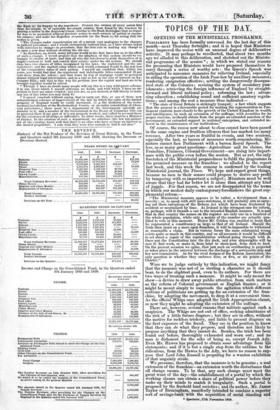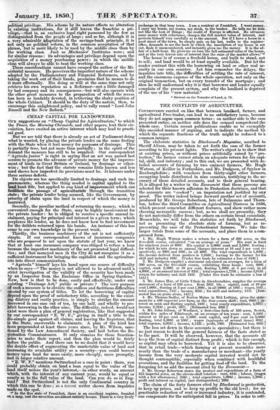TOPICS OF THE DAY.
OPENING OF THE MINISTERT A T, PROGRAMME. PAnkuismir has been formally convened for the last day of this month-next Thursday fortnight ; and it is hoped that Ministers have improved the recess with an unusual degree of deliberative activity. It may perhaps be recollected, that about two months ago we alluded to this deliberation, and sketched out the Ministe- rial programme of the session " ' • in which we stated our reasons in for presning that Ministers would have prepared themselves to carry through a series of worthy acts: the Queen's Speech was anticipated to announce measures for relieving Ireland, especially in aiding the operation of the.Irish Poor-law by auxiliary measures ; rendering emigration effective ; settling the dangerously disorgan- ized state of the Colonies ; revising the system of secondary pun- ishments; retrieving the foreign influence of England by straight- forward and liberal national policy; reforming the law; advan- cing education ; establishing sound and sufficient sanatory regula- tions; and among the rest a measure thus indicated- " The state of Great Britain is strikingly tranquil ; a fact which suggests that the present is a favourable period for making the representation in Par- liament conform more closely to the growth of the United Kingdom in wealth and intelligence, by such an extension of the suffrage, with securities for its proper exercise, as should obtain from the people an extended sanction of the government, an extended support in national enterprises, and extended in- terest in the maintenance of our institutions."
Of course, the recess now about to close cannot have been passed in the same supine and fruitless idleness that has marked too many recesses. After two years so fruitful in events, and two sessions, especially the last, so barren of measures worth remembering, Mi- nisters cannot face Parliament with a barren Royal Speech. The less, as so many great questions- -Agriculture and its claims, the Franchise, Finances, Colonial Government-are rising into import- ance with the public even before the session. But as yet, the only foretoken of the Ministerial preparedness to fulfil the programme is the promised measure on the franchise : we alluded to the report last week, and this week the rumour is confirmed by the leading Ministerial journal, the Times. We hope and expect great things, because no men in their senses could propose to derive any profit by tampering with so important a subject ; Ministers must be well aware that they had far better let it alone than attempt any kind of juggle. • ,For that reason, we are not disappointed by the terms in which our modest daily conteinporaryforeshadows the great sup- plemental reform- " The Ministerial measure appears to be rather a development than a novelty; or, to speak with still more strictness, it will probably aim at carry- ing out those intentions of the Reform Act which have been frustrated by accident or neutralized by time. As Ireland is the strongest case for reform, so, perhaps, will it furnish a cue to the intended English measure. It is said that in that country the names on the register are only one in a hundred of the whole population, while only a moiety of the number are actually qua- lified to vote at this moment. Hence Mr. Cobden was enabled to boast that he represented a constituency as large as that of all Ireland. Should the Irish then insist on a more open franchise, it will be impossible to withstand so reasonable a claim. But in various forms the same substantial wrong exists quite as much in this country, and on all accounts it would be difficult to set about a repair of the representation without going through with it. Once put the Constitution into the dry dock, and your shipwrights will be sure to find work, or make it,. from head to stern-post, from deck to keel. On the present occasion we opine, that just such an overhauling is projected as takes place in the interval between the discharge of a serviceable ship and her new commission. As for the rival designs of the Reform Association, the only question is whether they embrace four, or five, or six points of the Charter."
Were we to judge entirely by this indication, we might fancy that the measure was not of so sterling a character as it should bear, to do the slightest good, even to its authors. For there are two ways of treating such a measure. It might be only meant for show-a device to draw away publics attention from such matters as the reform of Colonial government or English finance ; or it might be meant simply to supersede the agitation which different sections of politicians are getting up for an extension of the fran- chise, by adopting the movement, to drop it at a convenient time. As the official Whigs once adopted the Irish Appropriation-clause, so now they might be adopting the extension of the suffinge.
There are, however, several reasons that militate against such a suspicion. The Whigs are not out of office, seeking admittance at the risk of a little future disgrace ; but they are in office, without • the motive for reckless trickery, and liable to present disgrace on the first exposure of the fraud. They are in the position to know that they can do what they propose, and therefore not likely to propose anything that they cannot do. Besides, the trick has been found out before, thoroughly exhausted and worn out ; and no man is dishonest for the sake of being so, except Joseph Ady. Even Mr. Hawes has proposed to obtain some advantage from his statements ; and if it is but a single step from the sublime to the ridiculous, from the Hawes to the Ady, we have no reason to sup- pose that Lord John Russell is preparing for a wanton exhibition of that ungainly stride.
We presume, therefore, that the measure is to be genuine ; a real extension of the franchise-an extension worth the disturbance that all change causes. To be that, any such change must rqeet the great want of the day-the establishment of a portal by which the working classes can obtain a share of political power before they make up their minds to snatch it irregularly. Such a portal is proposed by the freehold land societies ; and its author, Mr. Tames Taylor of Birmingham, manifestly intended to combine a superior sort of savings-bank with the acquisition of social standing and
• Spectator, 11th November 1849.
political privilege. His scheme by its nature effects no alteration in existing institutions, for it still leaves the franchise a pri- vilege,-that is, an exclusive legal right possessed by the few as distinguished from the people at large ; and so far, although it is a very admirable adaptation of the savings-bank principle, it is not only no political reform, in the common acceptation of that phrase, but is more likely to be used by the middle class than by the working class. Just as Mechanics' Institutes were ; and for similar reasons : its advantages and privilege depend upon the acquisition of a money purchasing power ; in which the middle class will always be able to beat the working class. These considerations cannot have escaped the author of the Mi- nisterial measure. He perceives the imperfect nature of the scheme adopted by the Parliamentary and Financial Reformers, and by taking the work out of their hands, proclaims that he means to do it more effectually. His doing so will at the same time not only retrieve his own reputation as a Reformer-not a little dayno&ea by bad company and its consequences-but will also operate with the other great measures to the preparation of which the recess has been so laudably devoted, in retrieving the shaky position of the whole Cabinet. It should be the duty of the nation, then, to encourage this enlightened policy, and to rally round "Lord John Russell and the New Reform."



























 Previous page
Previous page